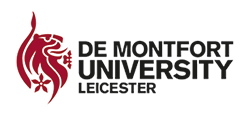A Level 7 Degree Apprenticeship Considered for Professional Strategic Leaders
Start date: October 2023 | Apply Today
Enquire here
De Montfort University (DMU) and NSIRC have partnered to create a unique apprenticeship that addresses, and responds to, the changing demands and dynamic situations of modern executive roles.
The aim of the program is to provide learning that supports strategic leadership, high level decision making and consideration of the future of work.
It nurtures a diverse and novel management knowledge base, enabling successful apprentices to improve strategic thinking, and develop the analytical and critical thinking skills necessary to solve problems and lead complex change.
Who is Suitable for this Programme?
This programme would be ideal for both professional strategic leaders and aspiring senior leaders in private, public or third sector organisations of all sizes and for individuals who lead, manage and direct organisations.
Qualifications
Upon successful completion, graduates will obtain:
- Level 7 Post graduate Diploma in Business Administration (awarded by De Montfort University)
- Level 7 Senior Leader Apprenticeship
- Opportunity to gain Chartered Manager status (CMgr MCMI) at the End Point Assessment.
About De Montfort University (DMU) Leicester
DMU is from the City of Leicester in the United Kingdom, producing high standards of undergraduate and postgraduate research from world-class facilities. The University has been recognised and ranked Gold by the Teaching Excellence Framework, an award that considers the impact of student research and excellence in teaching and learning.
DMU is also ranked in the Top 50 universities in the world for sustainability in Times Higher Education (THE) University Impact Rankings for 2019. It became an affiliate university and partner of NSIRC in July of 2020. The University also has a renowned business school, Leicester Castle Business School.

TOP
Modules for this program include:
- Dynamic Leadership for Organisations
- Financial Decision Making
- Strategy in Turbulent Times
- Reshaping the Future of Works
- End Point Assessment (Each module worth 30 credits except for the End Point Assessment).
Dynamic Leadership for Organisations
This module introduces apprentices to the principal issues facing organisations in the twenty first century in respect of leading, managing and shaping organisations to create value for a range of stakeholders. It aims to develop the vital people management skills and knowledge considered to be necessary for managers and leaders to work with the complexities presented in modern contexts and respond to these in a reflective, agile, creative, and adaptable manner.
The module will explore Organisational Leadership, particularly within the reality of the new dynamic environment within which businesses operate today. Apprentices will have the opportunity to explore the evolution of leadership theories, leading to more modern leadership concepts (ethics, governance, diversity, emotional intelligence, etc).
This higher apprenticeship will explore and reflect on individual leadership styles and the need for resilience, robustness and agility, as business environments internally and externally evolve. There is particular emphasis on VUCA (volatile, uncertain, complex and ambiguous) as a conceptualisation of today's business environment.
Financial Decision Making
Considers the dynamics of numerical data and information and your role in current business, management practices and business development. The module will employ case studies which illustrate how to interpret and effectively utilise financial information in a manner which adds value to business decisions and integrates financial information in the light of the realities of business strategy shaping in the contemporary era.

It examines the blend of financial analysis and managerial judgment required to make sound decisions, and will cover key principles for financial decision making; financial statements and their interpretation; Investment appraisal methods; sources of long-term finance; cost of capital; dividend policy; working capital management and procurement. The module assists development of the skills required to oversee and implement monitoring finance strategies for budgets and how to allocate resources, as well as principles relating to CSR and regulatory compliance. In addition, an important part of this module is developing the ability to undertake research and critically analyse and integrate complex information.
Strategy in Turbulent Times
This module provides insight through engagement in a blend of contemporary theoretical thinking and application, in the field of strategic management. The central underpinning of the module is the exploration of the strategic management process using a simulation exercise, with participants proactively encouraged to apply and rethink the utility of strategic concepts and frameworks in strategic planning and decision-making, in both planned and emergent contexts and how this can play a role in value creation.
The criteria, learning materials and teaching/learning methods are designed to expose apprentices to key theoretical approaches and at the same time to critically challenge existing norms in the field, develop apprentices' knowledge and understanding of key issues relating to strategising in turbulent times and the processes of strategy-making.
The module encourages apprentices to think critically and strategically about strategy, competition and business development and the tools, knowledge and skills for managing strategy in future employment.
Reshaping the Future of Work
This module examines change associated with social, human, economic, policy and technical dimensions and how this is reshaping work landscapes. It takes a holistic approach that links technical and social-psychological perspectives, recognising the validity and complementarity of each in the analysis of organisational dynamics and the creation of value.
It examines work and employment in the context of broader and innovative developments and how new ways of work can be built to thrive in the new digital era. The module draws on prior learning achieved to date to contextualise this in terms of change, and leadership required future and forward directions and scenarios, as well as a foundation for the development of critical thinking.
The module will use case studies and guest speakers to invite discussion on the changing nature of employment in contemporary organisations, such as new developments in global trade, technological change and shifting organisational structures. This will include the nature and type of work that is available, how work is organised and the impact of automation, work and well-being. These issues will be evaluated through temporal and crosscultural comparative analysis and apprentices will be encouraged to reflect on the impact on their own sector and/or organisation. .
End Point Assessment
This mandatory and face to face module aims to provide the apprentice with an understanding of the End Point Assessment process (EPA) and apprenticeship completion requirements.
The EPA is conducted by an independent assessor from the nominated End Point Assessment Organisation (EPAO), comprising of a project proposal, presentation and Q&A.
This module will provide the underpinning knowledge and skills to enable apprentices to work independently towards their EPA The module will start after the Future of Work and Gateway review.
Content will cover the creation of a project proposal, presentation skills and practice, professional interview skills and a mock professional discussion. The module is delivered as a two-day workshop. Apprentices must complete both days of this workshop in order to move on through the EPA process as the final part of the apprenticeship programme.
Duration and Location
This blended work-based program is taught over 18 months and includes four subject modules.
The teaching time will include five study days per module, which will be delivered in two blocks.
Learning will be offered through a blended approach that will include a series of face-to-face and online seminars, real-world projects, interactive class room activities and simulations.
Taught days will be complemented with distance learning and self-directed study.
TOP
Assessment, Fees and Funding
Assessment
The programme is designed to enable apprentices to apply the academic theory to their own organisation and role. There are a variety of assessment methods including; reports, essays, group presentations, reflective diaries and case studies.
All apprentices are required to create a portfolio which will capture the knowledge, skills and behaviours developed on the programme and in the workplace. This will contribute to their End Point Assessment and enable apprentices to reflect, plan and evaluate their development.
Fees and Funding
This Senior Leader Apprenticeship program is fully funded by the apprenticeship levy and aligned to the Level 7 Senior Leader Apprenticeship standard, designed by employers in partnership with the Chartered Management Institute (CMI).
CMI Level 7 Senior Leadership Programme
This standard is allocated Funding Band 12 (£14,000) by the Institute for Apprenticeships and Technical Education (IfATE).
Optional MBA top up (at a cost) for candidates who successfully complete the program.
TOP
The programme is designed with professionals in mind, and this is reflected in the entry requirements. All applicants need to be employed by an organisation who will support the individual’s participation in the programme.
Applicants Require:
- A minimum of 2 years management experience and a degree at 2:1 or above or,
- Significant management experience (3 years minimum), and a strong track record of achievements in business and/or relevant professional qualifications.
TOP
If you have any further queries, please send them to NSIRC Team member Hannah Stedman via enquiries@nsirc.co.uk.
TOP
To enquire about the course, or to simply ask for more information about MBA degree apprenticeships, please email Hannah Stedman via enquiries@nsirc.co.uk.
TOP
*Further costs will apply for International residential trips.